Market Data

April 18, 2020
Beige Book Shows Sharp Drop in Economic Activity
Written by Sandy Williams
Economic activity contracted “sharply and abruptly” last month, according to the Federal Reserve’s Beige Book report. The report, covering activity through April 6, showed leisure and hospitality industries bearing the brunt of the decline.
“All Districts reported highly uncertain outlooks among business contacts, with most expecting conditions to worsen in the next several months,” said the report.
Most districts reported declines in manufacturing with some suffering more than others. Shutdowns in the auto industry and of non-essential business reduced demand for manufactured products and resulted in steep employment cuts.
Demand for food and medical products soared, but producers struggled with production delays due to infection-prevention measures and supply chain disruptions.
Four districts reported a decline in energy prices. The energy market saw oil and gas prices plummet, resulting in lower output and reduced investments. Prices increased significantly for freight and for some agricultural and commodity goods. Prices declined significantly for non-essential and luxury items, with companies turning to online sales to keep businesses afloat.
Employment declines were steep due to mandated closures and a severe drop-off in demand. In the near term, more job cuts are expected, but many firms hope to reverse layoffs and furloughs once business conditions recover. According to Labor Department data last week, 22 million people, or 13.5 percent of the labor force, have filed for unemployment since mid-March.
States are beginning to look at reopening businesses in May as infections subside in some regions, but until consumers are comfortable resuming normal activity, business will likely remain subdued.
In New York, one of the states hit hardest by COVID-19, reports from business sectors were “mostly quite negative to varying degrees.” Demand fell sharply in manufacturing and distribution, services, construction, real estate and banking and finance.
“All told, the tone of the Beige Book is as bleak as the economic reality we see every day,” said Jefferies economist Thomas Simons.







